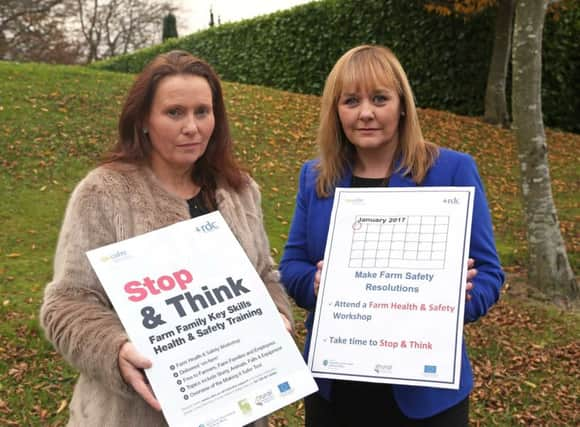Farmers urged to sign up for safety courses


Farm Family Key Skills (FFKS) is an initiative under The Farm Business Improvement Scheme (FBIS) which is a key element of the Rural Development Programme 2014-2020. The Northern Ireland Rural Development Council (RDC) has been appointed to deliver the health and safety training under the programme. Delivered on farms throughout Northern Ireland the training is free for farmers, members of the farm family and employees to attend.
Miss McIlveen said: “Health and safety continues to be an important issue for farm families and their employees. Major injuries on farm across Northern Ireland are up 10% on figures from 2014. The causes of injuries and fatalities on farm have remained the same and are normally risks that can be dealt with by raising awareness, making small improvements and adopting safer practices.
Advertisement
Hide AdAdvertisement
Hide Ad“These short workshops are free and provide an ideal opportunity to raise awareness of the continuing risks that are present on farm. I would encourage everyone to make 2017 a safer year on farms by attending a workshop.”
The short workshops starting in 2017, aim to raise awareness of the need for farm families to regularly look for potential risks and potential improvements. It places a greater emphasis on learning from the near-misses. Lessons can be learnt from near misses if immediate action is taken and improvements made. The training also highlights the need to spread the message of farm safety to farm employees, visitors to the farm and more vulnerable members of the farm family like children and older people.
Teresa Canavan, chief executive of RDC, added: “We need to develop a culture of safety on farms. Creating that culture involves every person on the farm. We need everyone involved in the industry to ask, what can I do every day to make my farm safer?”
She continued: “It’s very positive to see the number of farmers who attended the farm health and safety workshops in November and December. We would encourage all farmers, their family members and employees to make attendance a priority with the release of new dates for January to March 2017.”
Advertisement
Hide AdAdvertisement
Hide AdThe farm health and safety training programme covers the four main dangers associated with working on a farm; slurry, animals, falls and equipment (SAFE). The workshop also gives an overview of the Making it Safer online risk assessment tool which is a requirement when applying to the DAERA Farm Business Improvement Scheme.
For further information or to register for a workshop go online to http://www.cafre.ac.uk/industry-support/farm-family-key-skills/ or alternatively contact Anne Marie at RDC on 028 8676 6980 or via email to [email protected].
Managed by the College of Agriculture, Food and Rural Enterprise (CAFRE), the programme is funded through the Northern Ireland Rural Development Programme with support from the European Agricultural Fund for Rural Development (EAFRD).